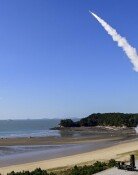Is the Ruling Party Attempting a Coalition Government Because It Cant Go On?
Is the Ruling Party Attempting a Coalition Government Because It Cant Go On?
Posted July. 12, 2005 03:15,
The Uri Party leadership, including Chairman Moon Hee-sang, is putting more pressure on the opposition party, demanding, The GNP should accept the offer of receiving nomination authority over the prime minister regarding the coalition government suggested by President Roh Moo-hyun.
However, with the GNPs refusal plainly clear, there are analyses that the ruling party is insisting on a coalition government, regardless of its feasibility, as a means to break through the current political situation.
Are Coalition Government Plans Means Rather Than Ends?
The primary reason President Roh brought up coalition government plans is the political situation, where the opposition party occupies the majority in National Assembly after a major victory in the April 30 re-elections and by-elections.
In other words, it means that the aftermath of the overwhelming election defeat felt by the ruling party is that much greater. Furthermore, the forecasted future political situation does not seem to hold much optimism for the ruling party.
The current situation where Uri Party approval rate is barely in the 10-20 percent range might continue to the October elections as well as next years regional elections. Most of all, as seen with the surge in oil prices and the lowering of the expected economic growth rate, there are no signs of an improving economy. If the ruling party loses in Octobers and next years elections, then the ruling partys grasp of political affairs will fall to rock bottom.
A movement to form a new party centered around former Prime Minister Goh Kun is another burdensome variable for the ruling party. That is because if a new party takes concrete form it is very possible that it might encroach upon the ruling partys votes in regional and other elections.
Even from inside the Uri Party, there are analyses that such a burdensome future political schedule is the real reason for suggesting a coalition government. By publicizing plans for a coalition government, the ruling party can spread the opinion that the majority opposition party and minority ruling party are the culprit for the confusion in political affairs. In order to overcome such a situation, the opposition party is offered a coalition government, which they will obviously refuse, so that the blame can be put on the opposition party. That is a theory for a political initiative scenario.
A senior party official said, It is true that the ruling party is grabbing the initiative of the situation as an effect of President Rohs proposal.
Opinions Differ Even within Ruling Party
There are a few opposing voices from within the ruling party regarding the ruling partys leadership such as President Roh and the chairmans plans to make the coalition government concrete by mentioning the GNPs right to nominate the prime minister.
Pro-Roh lawmakers overall stand was, We should understand President Rohs truth to overcome regional division. However, lawmakers close to future presidential runner-ups express discontent, Should the president interfere in all aspects of politics? That is because there are observations that the premise condition of the coalition government, which is reorganizing electoral districts, might ultimately lead to a constitutional amendment to form a parliamentary cabinet system.
Yeon-Wook Jung Yong-Gwan Jung jyw11@donga.com yongari@donga.com







